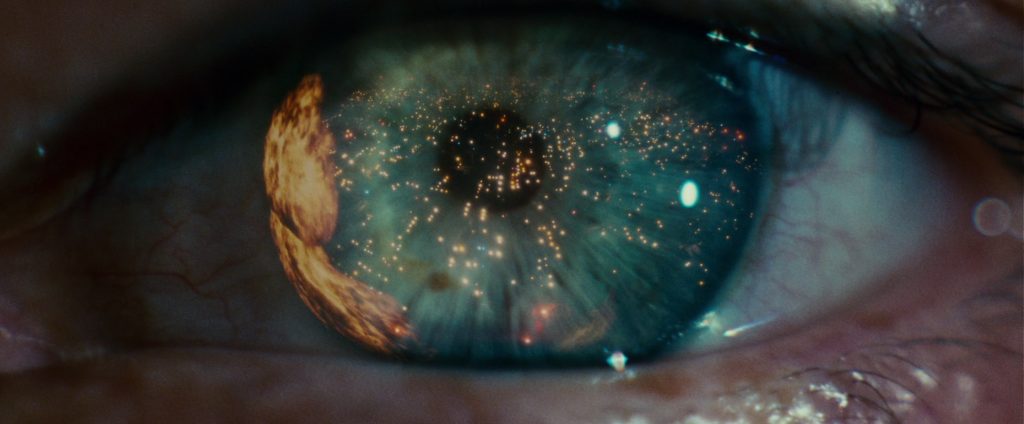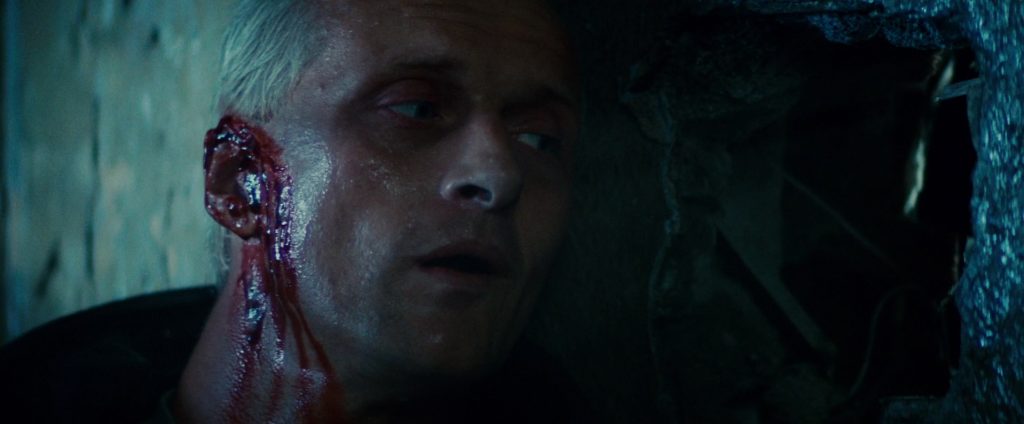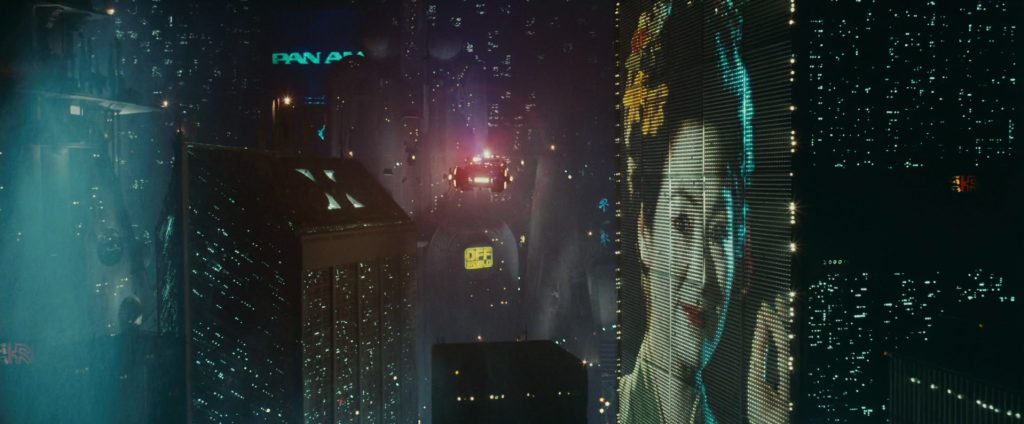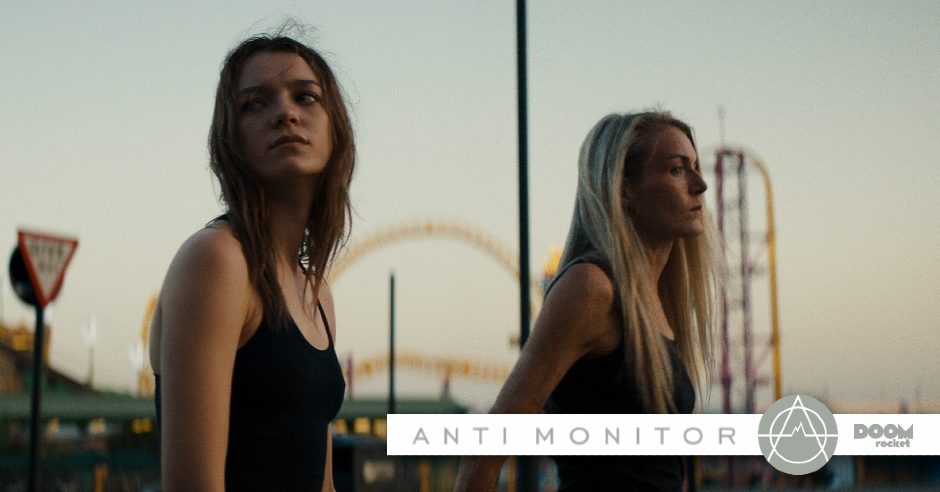by Arpad Okay. This is RETROGRADING, where we’ve seen things you people wouldn’t believe.

THE FILM: Blade Runner
THE YEAR: 1982. Ridley Scott leverages the power of Alien’s success to attempt another sophisticated genre film. Scott’s focus on making a visual statement allowed chaos to reign over two years of contentious production. Blade Runner bombs, but a decade later, an unauthorized, unfinished version sees a major release, and the film becomes the stuff of legend.
THE SPECS: Directed by Ridley Scott; written by Hampton Fletcher and David Peoples; starring Harrison Ford, Rutger Hauer, Sean Young, Joe Turkel, and Edward James Olmos; distributed by Warner Brothers. Rated R.

THE MAKE: Philip K. Dick was haunted by a Nazi diary he found in closed library stacks. The SS officer who had written it was troubled by his job at the camp, and the question of how one follows those kinds of orders led to Dick’s short story Do Androids Dream of Electric Sleep?, adapted into the film Blade Runner. The blade runner is a member of the secret police ordered to expose and execute replicants, androids who can pass for humans. His crime being an identity marked for death, the “muscular” Jew (utterly Arthur Syzyk) replicant Roy Batty fights the Gestapo agent (replete with leather jacket fit) blade runner, Rick Deckard instead of meekly submitting to the program of extermination. Is Blade Runner agitprop? True science fiction? More like a mess.
Scott’s film, written and then rewritten with a veneer of film noir, turns the blade runner role into an antihero movie protagonist. What Deckard does is not heroic. A lot of shooting unarmed civilian replicants as they try to escape. The disconnection between the story and the production’s approach to the material created a chasm left up to the actors to fill.
Scott was obsessed with the film’s lighting and cinematography, doing dozens of takes without paying attention to the actors’ performances, night shoots into the dawn, and screaming at his crew. Harrison Ford, in particular, suffers from Scott’s technical demands; the lead actor, badly in need of direction, finds none, and Deckard withers down to nothing as the movie goes on. Rutger Hauer, on the other hand, gets it completely. He understands that the blade runner is the film’s villain, and Hauer’s replicant takes up the space the deflated Ford fails to occupy.
There are seven versions of Blade Runner to choose from (he said in a tired voice). There wouldn’t be had the 1992 “Director’s Cut” never been made. I think it’s probably the version with the least meddling (besides the gigantic no-voiceover decision that Scott wasn’t initially involved with) and, I think, the most rewarding version to watch. The confident apathy of Ford’s voiceover in the original theatrical release, evocative of Jacques Tourneur’s noir Out of the Past, stands against both the flow of the movie and the character of his emotional performance. The voiceover undermines the role fate had to play in the filmmaking process. Without it, audiences responded. By focusing on the environment over all other factors, Scott invites poetic interpretations of Blade Runner. The movie is the set and the shot, not the actors. The performances are an excuse to be able to see the world.

THE REVIEW: Undeniably atmospheric. The future already broken down to be sold for parts was the zeitgeist of the time put to celluloid. The shooting locations were built to a technological level beyond the current age and then worn down into dystopian disrepair. Beneath the modifications lay a historic skeleton that lends to the faux noir of the film, as well as the atmosphere of WWII. 2019 LA is actually the New York Street studio lot at Warner, built in the 30s when pulp crime was the day’s genre. The proto-Deco stacked stairs inside the Bradbury Building are a Warsaw Ghetto in geometrically ornate ironwork.
It’s also sonically and visually rich, with a sweeping synth score from Vangelis. Blade Runner set the standard for sci-fi sound, inspiring film, and music, from techno and jungle to post-rock and dream pop. Everyone in the cast is either incredibly sexy or comically striking. It’s like reading an EC horror comic. Everything about it is as arranged as a static panel in a graphic novel; when it’s cooking, Blade Runner is an experience.
The cast is incredible. Scott’s previous elevated genre film success drew character actors like Joe Turkel and James Hong, the latter of whom continues to have a good sense of what movies will matter later and can carry a scene without the director doing much directing. Arresting, iconic performances despite the working conditions! Even Ford’s inability to deliver suits the story’s needs, Scott’s Alien abuse vérité working its magic again.
On the one hand, you have Fritz Lang’s Metropolis scale of practical effects, transforming the director’s vision of the impossible into a tangible viewing experience. On the other, the lack of direction, the struggle between multiple producers, the rewritten script. Scott was successful in the end, but one could hardly say he was in control of how the movie got made.
The two stories fighting each other in Blade Runner sucks. The script is going one way, the film the other. Ford’s Detective Smug Hardass is a blubbering morose goose-stepper, swinging unpredictably between self-confidence and incompetence, failing the protagonist role outlined in the script but inadvertently acing the role the allegory demands. Hauer improvises his final lines, arguably the film’s crowning moment. They weren’t in Blade Runner, but they needed to be.
Does being a replicant absolve Deckard from being a Gestapo agent? If the robot was just doing what it was programmed to do, what does that say about how human beings operate? Humans are the ones who choose to implement genocidal programs. But instead of focusing on the theme of Jewish resistance, the movie is centered on the emotional turmoil within an agent on the side of oppression tasked to kill. Batty’s galactic achievements are the side plot to Deckard’s. Blade Runner sometimes feels like a monster movie, but replicants are treated like the danger, the monster, even though it is they who are doomed.
The replicant’s compassion saves both the blade runner and Blade Runner. Batty has already proven himself physically stronger than Deckard; sparing Deckard shows he is emotionally stronger as well. Batty chooses like a human, but unlike a human, he chooses grace. The blade runner doesn’t deserve mercy (as the poet once wrote, “fuck Nazi sympathy”), but the replicant halts the cycle of violence instead of perpetuating it. To change things, you have to end hatred, not soldiers’ lives. The production fails, and the antagonist steals the show, all because that’s what the story’s truth requires? YHWH works in mysterious ways.

NOSTALGIA-FEST OR REPRESSED NIGHTMARE? It’s an intellectually engaging and culturally significant piece of art, but if you’d just as soon skip the robot Nazi movie, that’s cool.
RETROGRADE: B-
More RETROGRADING:
The Fly is Cronenberg’s tragi-gooey triumph












